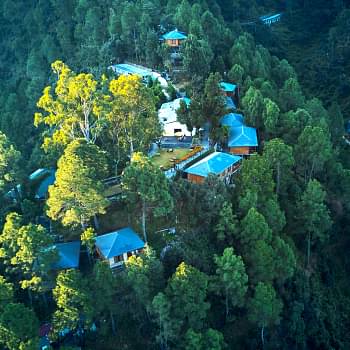January 14, 2020
What Can Mowgli Teach Us About Living In The Wild?

Revati Nargund


View all
140+
Resorts
January 14, 2020

Revati Nargund
The 1967 animated movie The Jungle Book is a firm favourite of adults and children across generations.
The 1967 animated movie The Jungle Book is a firm favourite of adults and children across generations. The adventures of a young ‘man cub’ ranged from finding ‘bear necessities’ and dealing with ‘monkey business’, to surviving the evil attentions of a tiger and a snake. But under the care and protection of Baloo and Bagheera, Mowgli is taken to the man-village, where his happily-ever-after begins.
The real consequences of being stranded in a jungle are unfortunately far more serious than the innocent adventures of the man cub. And while there are many among us who love the thrill of surviving on bare essentials, for the majority of us brought up with modern conveniences, the skills required to survive the jungle are often lacking. Not knowing some of the basics can bring even the strongest to their knees.
Man vs Wild
In the battle of man vs wild, we don’t necessarily have to graduate from the Bear Grylls’ school of survival skills. However, even on a well-planned trip you need to include teaching skills with modern as well as minimal tools. Know these, and there’s a greater chance of you and your team returning to your man-village safe and sound.
While risk management and wilderness skills are a start, the first thing you need to respect is the power of Nature. Ignore this at your own peril. And when it comes to knowing the basics, there are four absolute essentials you need to know:
• Navigation
• Sourcing and purifying water
• Building fires with modern and primitive tools
• Building a shelter
Of these, water is the most crucial. You can survive days without food. You may even survive without proper shelter. But you will not survive long without water.
Eye of the survivor
The serious side of survival training ensures that people stay focused. But the reality is you’re unlikely to find yourself alone while trying to find your way back to civilisation. You’ll be on a planned adventure with trained personnel, so let’s look at facets of living without the conveniences that you’re used to, in case you do decide to set off on an escapade in the jungles of India.
It’s all about planning – As you know from your alternative avatar at the workplace, you need to anticipate challenges and plan for them. So remember to pack the right quantity and kinds of food, ensure that your team members have appropriate clothing and gear, and check if any special supplies (medicines, dietary restrictions etc) that certain individuals may need are catered for.
Team dynamics – This is just as important as the essentials to live. You should assess your own and others’ personal skills and abilities, both physical and emotional, and consider group dynamics when farming out daily tasks. The key is to help and encourage each other – because, as you know, the whole is greater than the sum of its parts.
Select a good campsite – Like in a big city, it’s all about location, location, location. A good campsite can mean the difference between being wet, cold, and uncomfortable, and being dry and warm. Look for areas that are flat, close to a water source, and safe from natural hazards (potential of falling branches, loose rocks etc).
Build shelter – You must set up camp (tents, cooking area, build a fire etc) before sunset, so you have a good idea of the immediate surroundings. You must always keep your tents closed and food safe from other hungry jungle-dwellers.
Find water – While you will almost definitely have carried some water with you, it can never be enough. You will need water for cooking, personal hygiene, and to replenish drinking supplies. And this water may not be as safe as you think, so water purification tablets and iodine will come in handy.
Preparing meals – Travelling in the wild places enormous physical demands on a person, and nutrition is a crucial concern. Individuals must get an adequate balance of fats, proteins, and carbs. Menus need to be planned carefully so that everyone has the right amount of food to make it through the day.
Navigation – Reading maps, using a compass, and identifying natural and man-made features are essential to make your way to your destination. And all this can be done – believe it or not – without your smartphone!
Carry warm clothing – You may think the jungles of India are warm places. Big mistake! But rather than carrying heavy clothing, multiple layers are far more effective. You must ensure that you’re warm and dry before you get into your sleeping bag. If that means having an impromptu Bollywood party in the middle of nowhere, go ahead! Needless to say, do keep it quiet and don’t disturb the wildlife.
Maintain good hygiene – This involves not just keeping ants and other insects away from you, but also about keeping food safe. Whenever you get the opportunity, clean yourself and some of your clothing.
Respect Nature – Enjoy the wilderness in a responsible manner. Practice the ‘Leave No Trace’ principle to minimise damage to the environment, so that you leave Mother Nature as you found her – original and pristine.
Be physically aware – This is as much about yourself as your natural surroundings. Treat bites, aches and pains, potential blisters and the like before they become a problem. Just as importantly, support your team members if they’re struggling, or ask for help if you are.
Get in touch with your inner child – Let the beauty and sheer variety of Nature entrance you. Enjoy the views, look at the flora and fauna, perhaps have a mud facial, or jump in the river. Just because you can!
Jungle fever
India is home to some of the finest forests in the world. A trekking or survival adventure in one of them can be rejuvenating and exhilarating at the same time. Some of the best ones to visit are:
• Gir Forest, Gujarat
• Jim Corbett National Park, Uttarakhand
• Khasi Hills, Meghalaya
• Namdapha National Park, Arunachal Pradesh
• Bandipur National Park, Karnataka
• Nilgiri Biosphere Reserve, Tamil Nadu
• Keibul Lamjao National Park, Manipur
• Kanha National Park, Madhya Pradesh
• Vandalur Reserve Forest, Tamil Nadu
• Sundarbans, West Bengal
• Kaziranga National Park, Assam
• Periyar Wildlife Sanctuary, Kerala
• Satpura Range, Madhya Pradesh
• Jog Falls, Karnataka
So, when planning your next adventure, think a little outside the box. Perhaps Mowgli might provide inspiration. Or the thought of meeting the local ‘King Louie’ might entrance you. Coming across Col. Haathi is always an adventure, so let loose your wild side. Be a junglee!
Mahindra Holidays & Resorts India Ltd. (MHRIL), a part of Leisure and Hospitality sector of the Mahindra Group, offers quality family holidays primarily through vacation ownership memberships and brings to the industry values such as reliability, trust and customer satisfaction. Started in 1996, the company's flagship brand ‘Club Mahindra’, today has over 300,000 members , who can holiday at 140+ resorts in India and abroad.
We use cookies to personalise content and to provide you with an improved user experience.By Continuing to browse this site you consent to the use of cookies.Please visit our cookie policy for further details.

Welcome to ClubMahindra.com In order to provide a personalised experience for you, we use cookies to enable some website functionality. Cookies help us see which articles most interest you; allow you to easily share articles on social media channels; permit us to deliver content personalised to your interests and locations; along with many other site benefits. For more information, please review our Cookie Policy
When you visit any website, it may store or retrieve information on your browser, mostly in the form of cookies. This information might be about you, your preferences or your device and is mostly used to make the site work as you expect it to. The information does not usually directly identify you, but it can give you a more personalized web experience. Because we respect your right to privacy, you can choose not to allow some types of cookies. Click on the different category headings to find out more and change our default settings. However, blocking some types of cookies may impact your experience of the site and the services we are able to offer.
Because we respect your right to privacy, you can choose not to allow some types of cookies and you have the right to withdraw your consent by send a mail to email id [email protected]
These cookies are essential in order to enable you to move around the site and use its features, such as accessing secure areas of the site. Without these cookies, services you have asked for cannot be provided.
These cookies allow us to employ data analytics so we can measure and improve the performance of our site and provide more relevant content to you. These cookies don't collect information that identifies a visitor down to an individual level that is available to us. These cookies are not passing personally identifiable information to any external third party other than in limited cases when we engage a service provider to act on our behalf but who is then unable to use the data for their own purposes.
Performance cookies are generally third-party cookies from vendors we work with or who work on our behalf that collect information about your visit and use of the Club Mahindra website, for instance which pages you visit the most often, and if you get error messages from web pages. These cookies don't collect information that identifies a visitor. All information these cookies collect is anonymous and is only used to improve your overall experience on how the website works. Third party vendors may have access to this data and may use it to improve their overall services and offerings.
Functionality cookies allow a site to remember choices you make (such as your user name, language or the region you are in) and provide more enhanced, personal features. These cookies cannot track your browsing activity on other websites. They don't gather any information about you that could be used for advertising or remembering where you've been on the Internet outside our site.
Third-party advertising and social media cookies are used to (1) deliver advertisements more relevant to you and your interests; (2) limit the number of times you see an advertisement; (3) help measure the effectiveness of the advertising campaign; and (4) understand people's behaviour after they view an advertisement. They are usually placed on behalf of advertising networks with the site operator's permission. They remember that you have visited a site and quite often they will be linked to site functionality provided by the other organization. This may impact the content and messages you see on other websites you visit. If you do not allow these cookies you may not be able to use or see certain these sharing tools content on our website.